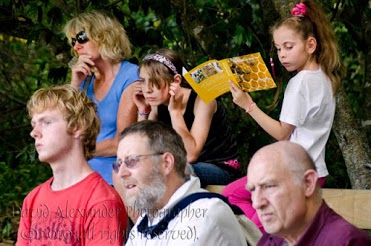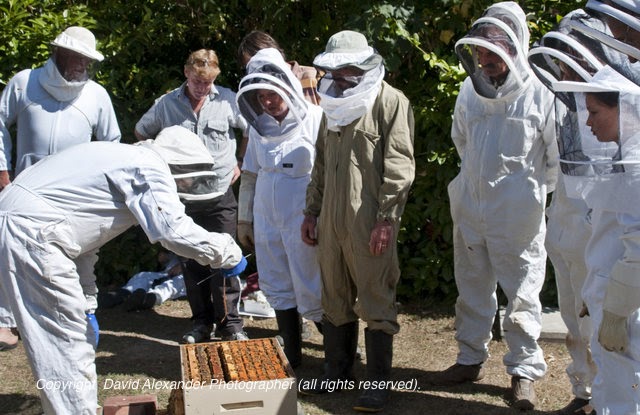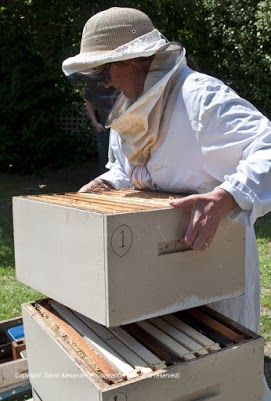First Saturday of each month, Aug to May (2nd Saturday in January)
9.30am start 12:30pm finish
It is expected that you carry on you any medication that you may need, -(there’s no point in it being locked in your car in the back paddock when you need it.)
681 Cashmere Road, Hoon Hay Valley – sign posted
(Access via driveway of 678 Cashmere Rd)
Google maps:
https://goo.gl/maps/zgsPxMXDVNr
**Parking is only permitted in the first paddock going up the drive on the left** NB – Close the gate if there are animals in the paddock.
**Please bring your apiary registration number with you and write it down next to your name when signing in**
We start with an activity and invite you to then listen to an informative talk followed by everyone participating in checking our hives.
The hives will ONLY be opened if the air temperature is warm enough.
We expect you to bring your own bee suit. Limited number of suits available only to first time new people being introduced to beekeeping.
DO NOT bring any gloves to our hive site as this can spread disease.**Cancellations will be posted to the website so please check if you are unsure, or you are welcome to phone a committee member to confirm**
The main events at our Club are the regular Field Day meetings. These are usually held in the morning of the first Saturday of the month at the Club Site in Cashmere, just to the south of Christchurch. The Field Days provide an opportunity to:
- get together with other beekeepers and club members
- learn new techniques
- improve their beekeeping knowledge and skills
- share their own ideas and experience
- find out about different aspects of beekeeping
- play an active role in the life of the Club
Our Field Days provide an important opportunity for members to enhance their technical knowledge of bees and beekeeping. On arrival at the Field Day, everyone is asked to ‘sign in’ and will usually be given a sticker or badge to write their name on. The formal activities usually start at 9:30am with a welcome by the President or their deputy. This allows the President and Committee members to make any important announcements, gives updates on relevant issues and share Club news.
The Field Day then continues with a practical demonstration or talk about a specific aspect of beekeeping by an expert from the beekeeping community. Previous speakers have included experienced club members, bee breeders, commercial beekeepers, the Apiculture Technical Advisors from AsureQuality and visiting experts from New Zealand and overseas. These presentations are always followed by a ‘Question and Answer’ session for members. And once or twice a year, we invite beekeeping retailers to display a range of goods and equipment for sale at specially discounted club rates.
Weather-permitting, the Club will then invite members to join us in inspecting the club hives. The club has four hives and we usually form into separate groups to work each one. Each inspection is led by an experienced Hive Manager with support from a volunteer helper. The inspections will usually have at least one specific purpose or aim. Examples might include inspecting for mites or disease, harvesting honey, requeening the hive or preparing the hive for winter. The Hive Manager will take time to explain what they are doing and answer any questions. However, members and visitors are encouraged to play an active role during the inspections. For example, they are often invited to light the smokers (and try to keep them going), handle frames and give their opinion on what is happening within each hive. After all, the best way to learn about beekeeping is by doing it!
Please note: Everyone needs to wear a veil and make sure that their arms and legs are covered when inspecting hives. The Club can lend a few spare veils and some beekeeping overalls for those who do not have their own. However, a long-sleeved shirt and long trousers tucked into your socks will generally do the trick.
If you are returning a suit you taken home to clean, (remember we regularly clean them ) let Kerry or Jeff G. know.
Once the inspections are complete and the hives re-assembled, the hive managers will complete the Hive Diary so that we have a record of what was found and what actions have been completed in each hive. By now, it is usually time for a cup of tea and bite to eat and a chance to chat to your fellow beekeepers. This part of the afternoon is a great opportunity to catch up with other members and check out the books in the CLUB LIBRARY. These are available for loan without charge by club members.
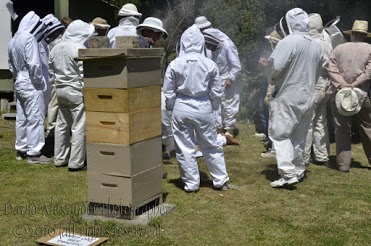
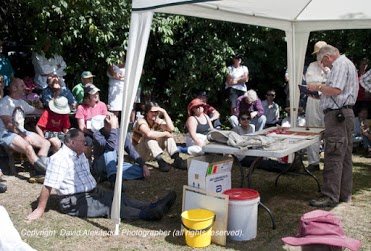
Essential Information
The CLUB FIELD is situated at 681 Cashmere Road in Christchurch . See here for directions.
Our Field Days are held the first Saturday of each month from August through to May, except for January when it is held on the second Saturday. We do not usually hold Field Days in June or July because it is too cold to work the hives.
The formal activities at our Field Days start at 1.30 pm. Members are welcome to arrive early and help with setting up. This usually involves quick tasks such as filling and lighting the billy, shifting tables and chairs or erecting the ‘pop-up’ gazebo. We also hold a BBQ for members at our Field Days at least twice a year. These start a little bit earlier so please check the CLUB CALENDER for exact times.
Living in New Zealand means that we expect changeable weather. If the weather is too wet or cold to hold the Field Day, a cancellation notice will be announced on the Club forum or GOOGLE GROUP. All being well, we will reschedule the meeting for the same time the following Saturday.
Field Days are one of the most significant benefits the Club provides to its members. While visitors are welcome, Club rules state that non-members are allowed two Field Day visits before they must join the Club.
Health & Safety at Field Days
While they will not generally do so unless provoked, worker bees do have the ability to sting. Some people are sensitive to bee stings and may suffer an allergic reaction. For this reason, we ask that anyone intending to work or observe a hive at close range to wear a veil and protective clothing. If you have your own veil and/or bee suit, please bring it with you. In the interests of hygiene, these should be clean, so please wash them if you have previously worn them while working your own hives. As mentioned above, the club does have some spare veils and suits that it can lend to visitors. Otherwise, a long-sleeved shirt and long trousers will be fine. Remember that bees are attracted by the colour blue and have an uncanny ability to find any gap in your clothing, however small it might seem. It is a good idea to bring some elastic bands to put around your trouser legs or wear long socks that you can tuck your trouser legs into.
Please do not bring any gloves, tools or any other used beekeeping equipment such as frames. This is to prevent the spread of mites and disease.
